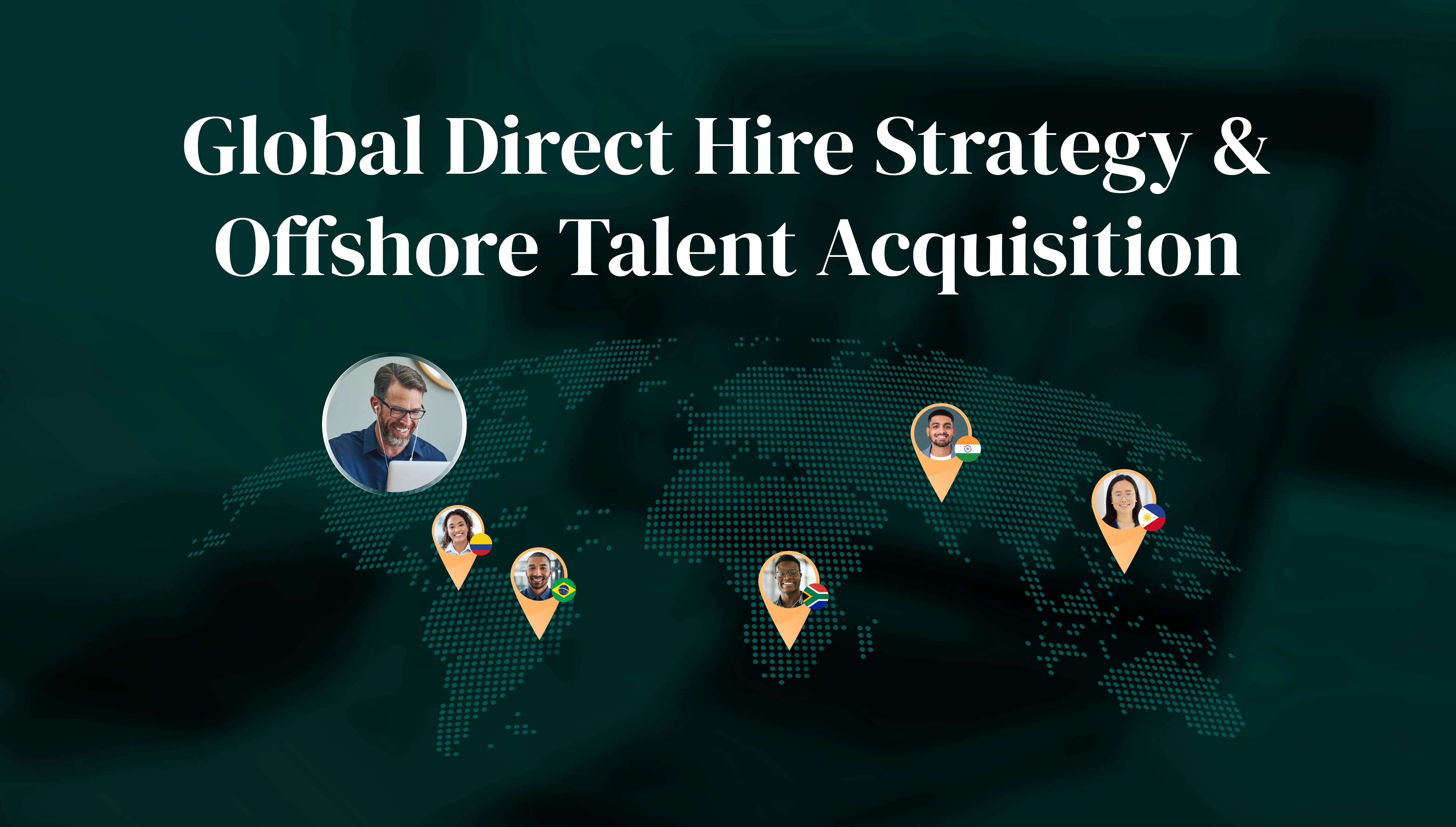A few months ago, a founder I know lost one of their top sales reps. Not to a better salary or some flashy startup perks, but to a recruiter who called at exactly the right moment: right after the team missed their quarterly bonus threshold. Morale was shaky, uncertainty was creeping in, and the timing couldn't have been worse.
I've seen this play out many times. With clients, competitors, and peers. And it always reinforces the same lesson: great sales talent rarely comes from job boards. It's not about inbound applicants. It's about proactive, targeted outreach.
That recruiter didn't just get lucky. They were running a disciplined playbook: timing, relationships, and precision. Meanwhile, my client had been managing their pipeline passively, while someone else was actively managing theirs.
That's the mistake many companies still make with sales recruitment. They treat it like a volume game. They fill seats and hope for the best.
But it's not about seats. It's about closers. True sales hunters. The difference isn't subtle; it's the difference between surviving and scaling.
Some of the strongest hires I've seen weren't looking for jobs. They were referred, or they were placed by recruiters who understood exactly what the company needed, often before the company did.
The right agency can elevate your sales team. The wrong one becomes an expensive lesson. This guide is here to help you tell the difference.
Top 10 Sales Recruitment Agencies
We've picked out the best sales recruitment agencies, so you can choose the ideal partner based on your business needs.
1. Somewhere
Somewhere is the best sales recruitment agency overall. Hey, that’s us! We've perfected the art of finding exceptional sales talent globally while delivering massive cost savings. We employ some exceptionally good recruiters who can find the right candidate for any position.
We offer 70-80% payroll savings compared to US equivalents without compromising quality. In fact, we have a very rigorous vetting process: we screen thousands of candidates monthly and present only the top 0.5%. Whether you need to hire SDRs, hire account executives, or hire sales managers, at Somewhere, we'll handle everything from sourcing to onboarding.
2. Sales Talent Inc.
Their data-driven approach and focus on passive candidate attraction sets them apart. They've earned multiple "Best of Staffing" awards and maintain an impressive +91 Net Promoter Score.
3. Peak Sales Recruiting
They use scientific testing and validation methods to ensure candidates are the right fit. Their selective approach means they only work with clients and candidates they believe are truly at the "peak" of their industry.
4. Korn Ferry
They have a global reach with deep industry expertise and data-driven assessment tools. They excel at placing sales executives in leadership positions.
5. Betts Recruiting
Their innovative recruiter subscription model (RaaS) offers unlimited hires with full recruiter support. They have nearly 15 years of experience in the tech space.
6. Robert Half
They have an extensive global network with offices worldwide. They offer both temporary and permanent placements with strong local market knowledge.
7. Michael Page
They have a strong international presence, with expertise in placing sales professionals across a range of industries.
8. The HT Group
Deep local market insight and personalized service. They offer temp, contract-to-hire, and direct-hire placements.
9. Pareto Law
Unique focus on developing entry-level candidates into sales leaders through comprehensive training programs.
10. Rainmakers
Modern approach using matching algorithms to ensure cultural alignment. They focus specifically on the high-demand tech space.

Why Use a Sales Recruitment Agency?
A founder I know recently told me, "I used to think recruitment agencies were a waste of money. Then I spent four months trying to hire a sales director on my own."
The results? Three no-shows, two candidates who fabricated their numbers, and one who tried to pitch his side business during the interview.
Meanwhile, his closest competitor hired two top-performing reps through an agency and had already launched a new region by the time his role was still open.
Access to Hidden Talent
Here's the truth: the best salespeople aren't actively looking. They're not on job boards or tweaking LinkedIn profiles. They're heads-down, hitting quota, and ignoring recruiter spam.
What sets great agencies apart is access. They build relationships long before candidates are "open to work." From my own experience managing large-scale searches, I've seen how a well-developed network can include thousands of verified, high-performing reps across different industries and geographies; talent you'd never discover through traditional channels. That's what clients are truly paying for: not generic reach, but meaningful, strategic access.
Time and Cost Efficiency
Let's do the math. A bad sales hire can cost upwards of $240,000 when you account for salary, ramp time, lost pipeline, and internal disruption.
A recruitment agency might charge 20-30% of first-year comp, not insignificant, but still a bargain if they save you from even one bad hire. Plus, you free up weeks of time spent reviewing resumes and chasing no-shows.
Market Intelligence
Good recruiters aren't just filling roles. They're embedded in the hiring market. They know what salaries are clearing, which skill sets are in demand, and how competitors are structuring offers.
A hiring manager I consulted with recently was struggling to fill an account executive role in Austin. Rejections kept piling up, and they couldn't figure out why. A quick market analysis showed they were offering well below current comp ranges; outdated 2019 salary data was skewing their benchmarks.
After recalibrating based on real-time recruiter insight, the role was filled within a month.
That's what good agencies bring to the table: frontline visibility into market shifts that spreadsheets and old reports won't catch.
Reduced Risk
Most reputable agencies offer guarantees. If your hire doesn't work out in the first 60 or 90 days, they'll find you a replacement. It's not foolproof, but it's far better than going it alone and hoping it works out.

Types of Sales Recruitment Agencies
Retained vs. Contingent Search
A retained agency works exclusively on your search; think of it like hiring a dedicated consultant. You pay an upfront fee, and in return, they commit serious time and resources. Ideal for executive hires or mission-critical roles where getting it wrong isn't an option.
Contingent agencies, on the other hand, only get paid if you hire their candidate. That makes it more flexible, and sometimes more competitive. You might work with two or three firms at once, and they'll be racing to get someone in front of you. It can work well for volume hiring, but you trade focus for speed.
Specialized vs. Generalist Agencies
Specialized agencies are exactly that: specialists. They focus on one industry, one type of role, and often one region. And when you're hiring for a niche position, that expertise matters.
Generalists can be fine for junior roles or generalist sales hires, but when you need someone who understands a complex sales cycle in a regulated market, specialization wins.
Local vs. Global Reach
Some agencies stay close to home, sourcing talent within your city or region. Others cast a wide net: across countries, continents, and time zones.
Global hiring can feel risky at first. Concerns around culture fit, time zone overlap, and communication aren't wrong, they just require the right setup. I've personally built remote sales teams in the Philippines who worked U.S. hours, communicated flawlessly, and performed at the top of their comp plan, all at a fraction of local costs.
But pulling that off takes more than luck. It takes an agency that understands how to screen for soft skills, cultural alignment, and timezone logistics. We'll dig into that later.
Factors to Consider When Choosing a Sales Recruitment Agency
Industry expertise matters more than you think.
Don't settle for surface-level understanding. Ask them to explain how sales cycles differ in your space. Can they speak fluently about selling into procurement vs. selling into marketing? Do they understand what will make your ideal buyer say "yes" and what will push them away from the offer?
If they stumble through answers or rely on buzzwords, move on.
Track record and reputation are easy to verify.
A credible agency should have real testimonials, not just vague endorsements or "Great insights!" on LinkedIn. Look at who's engaging with their content. Are actual hiring managers and sales leaders commenting, or just other recruiters? And always ask for references. If they hesitate, that tells you everything.
Process is the difference between strategy and guesswork.
A good agency should be able to explain, step by step, how they'll fill your role. That includes sourcing, screening, evaluation, and post-hire support.
If their approach sounds like "We'll post your job and see who applies," you're not working with a strategic partner. You're working with a middleman.
Communication style reveals professionalism.
How they engage with you during the sales process is how they'll engage when they're actually working your search.
Do they ask thoughtful questions? Do they clarify expectations or just say yes to everything? Are they responsive within 24 hours?
Inconsistent communication is one of the biggest red flags in a recruitment partner.
Pricing should be clear, fair, and fully transparent.
You don't want surprise fees two weeks into the search. Make sure you understand what's included in their rate: candidate screening, background checks, assessments, replacement guarantees.
Ask specific questions: "What happens if the hire doesn't work out in 60 days?" "Is there a sliding scale based on role level?"
And always get it in writing.
Geographic reach needs to match your hiring strategy.
If you're only hiring locally, you want someone who knows your market. But if you're open to remote or international talent, make sure the agency has experience navigating global searches, including time zones, cultural alignment, and labor law basics.
An agency that knows how to manage international placements is a different breed. Don't assume every recruiter can do it.
Remote Sales Recruitment: The Future Is Already Here
Still hiring only within commuting distance of your office? You're limiting your options, and probably overpaying for underperformance.
Remote work isn't new. But the pandemic proved, definitively, that it can work at scale. In sales, where performance is measurable and tools are digital, geography matters far less than it used to.
I've worked with companies that saw dramatic shifts after expanding their talent pool globally. One client cut their sales payroll by 60% and still managed to increase revenue by 40%. And they did so all by hiring top-performing reps in the Philippines, Latin America and South Africa. These weren't interns. They were closers, recruited through a specialized agency that understood exactly how to source, assess, and support remote sales talent.
But here's the catch: success in remote hiring isn't about casting a wider net. It's about knowing where to cast and how to reel in the right talent.
Posting on a generic job board won't cut it. You need recruiters who understand international hiring regulations, time zone logistics, communication expectations, and the subtle but important cultural dynamics that make or break remote sales teams.
Get that wrong, and you'll waste months. Get it right, and you'll never look back.
Tips for Working Effectively with Your Chosen Agency
You found an agency. Great. The next step is to ensure this collaboration thrives.
Be Crystal Clear About Your Needs
"I need a salesperson" is not a job description. Neither is that 3-page corporate mumbo-jumbo your HR department wrote in 2015.
Tell them stories. For example: "Our best rep right now is Sarah. She came from hospitality, actually. Never sold software before, but she gets people. She sent handwritten notes to prospects. Weird, but it worked. Find me more Sarahs."
That's useful. That's what gets you good candidates.
Provide Timely Feedback
Agencies send you three candidates on Monday. You respond three weeks later with "not a fit."
Congratulations, you just got moved to the bottom of their priority list.
Respond fast. Be specific. "Candidate A talked too much about process, not enough about results. Candidate B was perfect but wants too much money. Can we find Candidate B at Candidate C's price point?"
Now they can actually help you.
Trust Their Market Knowledge
When a good recruiter says your salary range is off, listen. They're not trying to jack up their commission. They're trying to get you someone who won't leave in six months for a 20% raise.
Maintain Regular Communication
Weekly check-ins during active searches. Sounds like overkill? It's not.
Markets move fast. That perfect candidate who was interested on Monday might have three offers by Friday. Stay close to the action.

Future Trends in Sales Recruitment
The recruitment world is shifting fast and the smartest agencies are adapting just as quickly.
- AI and Data Analytics
More agencies are leaning into tech that goes beyond gut feel. They're using data to predict performance based on behavioral traits, past outcomes, and industry benchmarks. It's not flawless, but it's getting impressively accurate. - Cultural Fit Over Experience
There's a growing focus on values alignment and coachability over pure résumé credentials. Ten years of SaaS sales doesn't mean much if the rep can't adapt to your team's style or your customers' expectations. Skills can be taught. Attitude can't. - Remote-First Approach
This isn't just a trend anymore, it's the norm. Agencies that don't specialize in remote hiring are behind the curve. Geography is increasingly irrelevant, especially in sales where outcomes matter more than where someone logs in from. Business owners serious about long-term success should learn how to build and scale a remote-first company to fully leverage this shift. - Diversity and Inclusion
It's no longer optional. The best agencies prioritize building diverse shortlists and helping clients address representation gaps. If your agency isn't bringing this up, it might be time to find one that does.
Making Your Decision
Choosing a sales recruitment agency isn't rocket science, but it shouldn't be a guessing game either. I've seen businesses make costly missteps, not because they lacked effort, but because they treated recruitment like a transactional process rather than a strategic investment.
Start by identifying your real need. If you're hiring senior leadership, a retained specialist is usually worth the investment. Building a team of SDRs? A strong contingent agency might get the job done faster. Looking to go global? You'll want someone with deep international experience.
When you talk to potential partners, don't be shy. Ask hard questions. How many similar roles have they filled? What went wrong the last time they made a bad placement? You'll learn a lot from how they respond.
Trust your instincts, but back them up with facts. Check references. Ask for case studies. Look at the actual outcomes they've delivered. But also consider: do you want to work with these people? Because you'll be interacting with them frequently, especially during a high-stakes search.
One last thing: this decision impacts revenue, culture, and momentum. You're not just buying resumes. You're investing in the team that will drive your growth. Your sales org is the engine of your business. It's worth getting the right mechanic.
So, why not dive right in? Use the contact form below to book a call with the Somewhere team and we'll show you why we're the best sales recruitment agency out there.













.webp)
